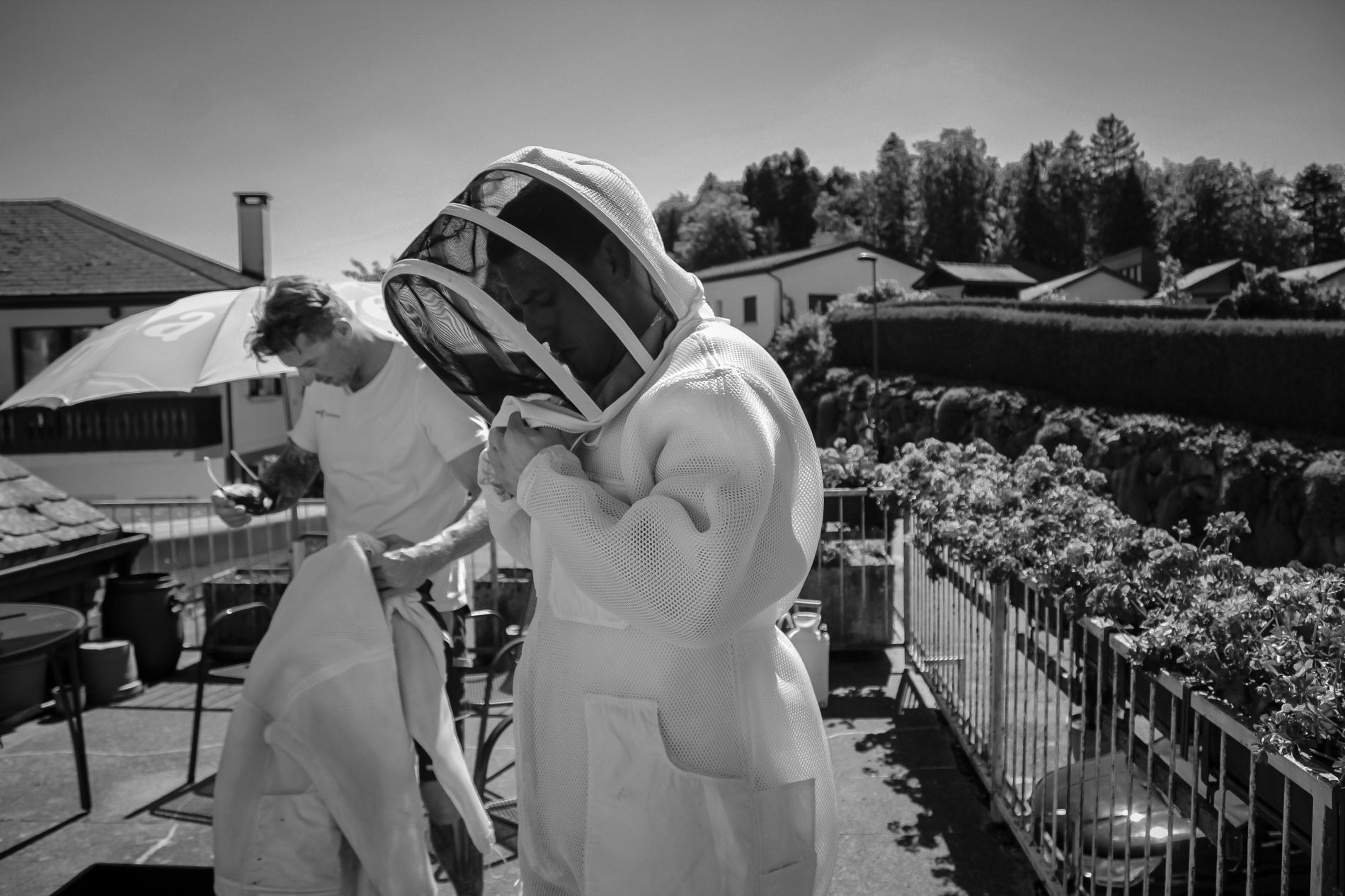
Fighting Asian hornets in Les Genevez (JU)
Have you discovered an Asian hornet's nest? We'll be on site quickly! Call now - Daily Mon-Sun 07:00-21:30. Contact us now: 058 510 22 54
Having the Asian hornet's nest removed
The hornet species Vespa velutina, native to South-East Asia, has aggressively extended its territory to Switzerland and the entire subcontinent. Although it does not pose a danger to humans, it is notorious for its predation on honey bees, raising alarm among beekeepers. Just a handful of these hornets can quickly wipe out a colony of bees within hours. If you have discovered a hornet's nest on your house, patio, shed, or in your blind box, contact our experts for hornet nest removal in Les Genevez (JU)!
Use the uncomplicated telephone service of the Hornet experts in Les Genevez (JU) and simply inform us at 058 510 22 54, we will be on site quickly so that you and everyone in your area feel completely safe again.
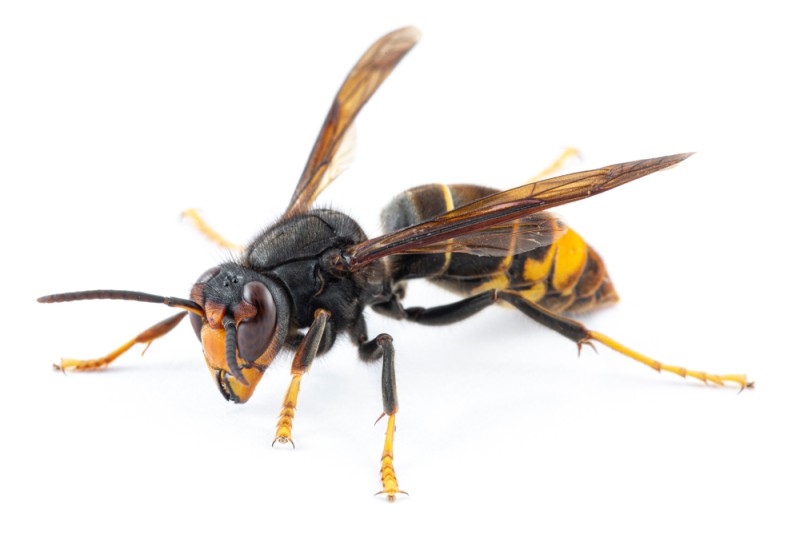

Appearance of the Asian hornet
Here are some characteristics that distinguish the Asian hornet:
1. Size: The queen can reach a length of about 3 cm, while the workers are slightly smaller and measure about 2.5 cm.
2. Color: The Asian hornet has a dark body that is almost black, with a yellow stripe at the back of the abdomen. Its face is orange-yellow.
3. Wings: The wings are dark and almost smoky gray.
4. Legs: The hornet has yellow tips on its legs, which is a striking distinguishing feature when it flies.
5. Nest: The Asian hornet's nest is often high in the trees, but it can also be found underground or in tall structures such as chimneys. It has an oval shape and is made of chewed wood, which gives the hornet a papery texture.
It is important to distinguish the Asian hornet from the European hornet (Vespa crabro), which is more harmless and a natural part of the European fauna. If you suspect you have found an Asian hornet nest near you in Les Genevez (JU), you should report this to the local authorities, or using our reporting form, as they can spread quickly and be harmful to bees and other insects. To avoid being attacked by the flying inhabitants, you should hire a professional pest controller such as the Hornet Experts Les Genevez (JU). We can identify the nest beyond doubt and take further steps to remove the Asian hornets professionally.
News about the Asian hornet in Les Genevez (JU)
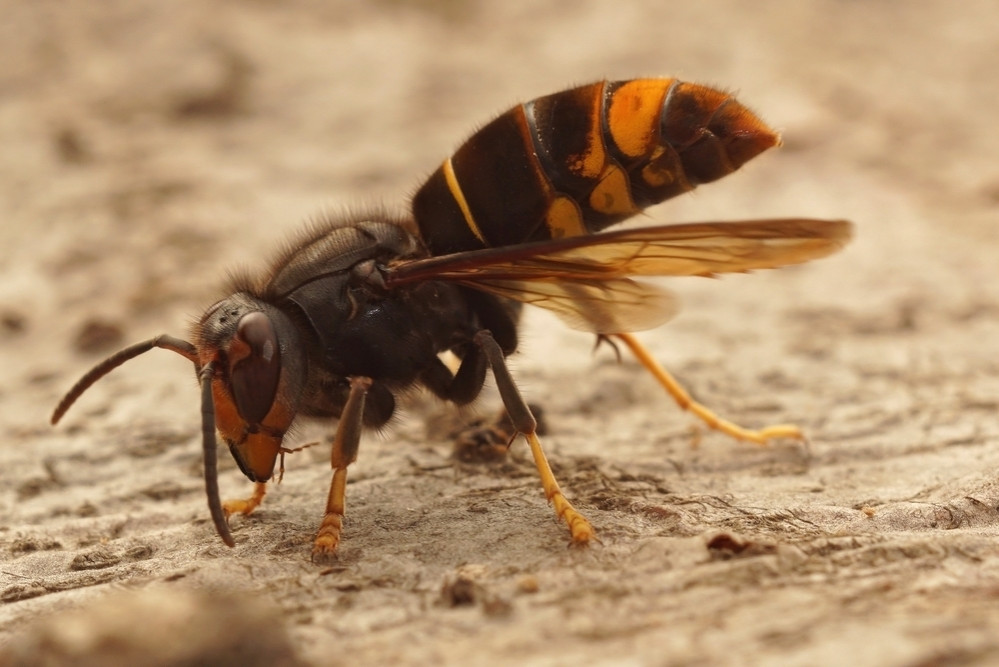
02.12.2025 Western Switzerland: Killer hornet eats bees
The territory of the Asian killer hornet has expanded considerably this year, with a notable increase reported in western Switzerland. This invasive species poses a significant threat to native bee populations, as bees make up the majority of its diet. The potential consequences are serious. Moreover, the hornet represents a danger to individuals with allergies to its venom.
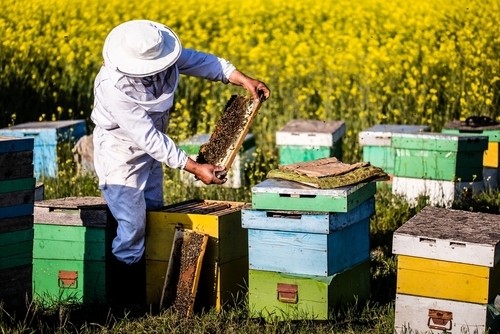
25.11.2025 Serious concerns about the bee population!
Asian hornets are inflicting significant harm on beehives across multiple parts of Europe, as reported by local beekeepers. Even a small number of hornets can destroy an entire bee colony within hours. This sharp decline in pollinators could have serious consequences for pollination, local ecosystems, and agricultural productivity.
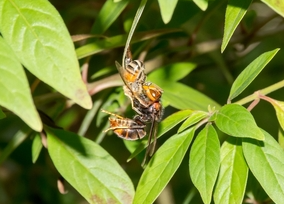
18.11.2025 Asian hornet doesn't just eat bees!
The danger it presents to insects is substantial!
The Asian hornet feeds largely on honeybees—up to 85 percent of its diet—alongside beetles and flies. This high level of predation not only poses difficulties for fruit growers but also further threatens already vulnerable bee populations.
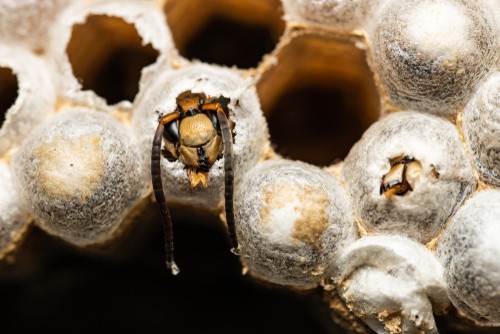
11.11.2025 How did the Asian hornet get to Europe?
The Asian hornet likely arrived in Europe unintentionally and has quickly expanded throughout France and nearby countries. Its adaptability to different environments and the absence of natural predators have contributed to its rapid spread. A single nest can generate several hundred new queens in one breeding season.
Asian Hornet Reporting Form
Please fill out all required fields and submit the form.
Help us!
If you discover an Asian hornet or a nest of this invasive species in Les Genevez (JU), it is of the utmost importance that you report it immediately. The Asian hornet is not only dangerous to humans, but also poses a serious threat to native bee populations and the ecological balance in Switzerland.
Why is it important to report the find?
In regions where the Asian hornet thrives, its impact on native insects, especially honey bees, is considerable. With their tendency to prey on bees, these hornets generate a decline in pollinator populations, affecting the local flora as well as agricultural output. By reporting sightings, experts can react quickly, remove the hornets or their nests and thus prevent the spread of this invasive species.
Notification form for sightings
Take part in the protection of our native insects! We urge you to report any suspicions or sightings of the Asian hornet using our specialized reporting form. With your help, we can intervene at an early stage and effectively mitigate the spread of this dangerous species, ensuring the preservation of our delicate ecosystems.
Your contribution is crucial in the fight against the Asian hornet in Les Genevez (JU). Together we can protect nature and maintain the balance of our ecosystems;
Thank you for your vigilant attention and your commitment to protecting our environment.
How dangerous is the Asian hornet?
The Asian hornet (Vespa velutina) is a predatory insect that originated in Asia and has spread in recent years to various parts of Europe, including France and now also Switzerland and in Les Genevez (JU). Although it poses a threat to honey bees and native biodiversity, it is generally no more dangerous to humans than other wasp species. Nevertheless, there are some aspects to be aware of:
1. Threat to honey bees: The Asian hornet preys on honey bees, threatening native bee populations. A decline in bees can have a negative impact on pollination and thus on local flora and agricultural production.
2. Stings: As with other wasp and hornet species, the stings of the Asian hornet can also be painful. For most people, the stings are unpleasant but not dangerous. However, people who are allergic to wasp or hornet stings can suffer a severe allergic reaction, which in the worst case can lead to anaphylactic shock.
3. Aggressiveness: Although the Asian hornet is not necessarily more aggressive towards humans than other wasp species, it can become aggressive if it feels threatened, especially near its nest.
4. Ecological effects: Apart from the direct effects on honey bees, the spread of the Asian hornet can also disturb the ecological balance by affecting the populations of other insects.
Recognizing the dissimilarity between the Asian hornet and the Asian giant hornet (*Vespa mandarinia*) is crucial to avoid confusion. The giant hornet, referred to as the "killer hornet," is notably larger and carries a more potent venom, which increases the potential risk to humans compared to the Asian hornet.
If you have discovered a nest, call us immediately: 058 510 22 54
Our hornet professionals in Les Genevez (JU) are certified by the VSS.
Frequently Asked Questions About Asian Hornets in Les Genevez (JU)
With the potential to inflict dangerously severe stings, the Asian hornet is an insect of great concern, surpassing the threat level posed by most other hornet species.
The Asian hornet commands attention with its considerable proportions, stretching up to 3 cm in length. Its slender, glossy black body is adorned with an intricate arrangement of vibrant orange, yellow, and black stripes.
Though usually displaying a calm and unassuming attitude, the Asian hornet can dramatically shift its behavior in response to threats or confinement. It becomes remarkably active and fiercely aggressive, fiercely defending itself from perceived danger.
It is of utmost importance for humans to be wary of the Asian hornet's strikingly poisonous attributes, as its bite can cause severe pain and provoke allergic reactions.
The venomous sting of the Asian hornet renders it risky, highlighting its dangerous nature. Its sting is more excruciating compared to other wasps and can potentially cause allergic reactions.
To report the appearance of an Asian hornet, reach out to a designated wild bee protection officer in your region or contact the appropriate department within the Ministry of Agriculture to file an official report.
Reporting Asian hornets is vital to evade potential attacks and restrict the spread of this species. Their territorial and aggressive demeanor necessitates proactive reporting to minimize risks.
Managing Asian hornets in Switzerland effectively requires professional hornet control interventions. To ensure this, it is recommended to call upon the expertise of a reliable pest control service.
The Asian hornet is not protected, which underscores the importance of actively monitoring their numbers to prevent their unfettered spread.
During their hibernation period, Asian hornets may either form colonies or prefer solitary habitation, frequently selecting corners of walls, buildings, garden sheds, makeshift structures, or tree hollows.
Would you like more information about Asian hornets? Then take a look at our FAQ's about Asian hornets.
Private inquiry form
For an uncomplicated request to remove an Asian hornet's nest, please use our contact form for private individuals.
Real estate inquiry form
Use our property management order form to request the removal of an Asian hornet's nest.
Ecotox GmbH
Partner of: frelon-asiatique-suisse.ch & asiatische-hornisse.ch




_6.jpeg)
_8.jpeg)
_9.jpeg)
_9.jpeg)